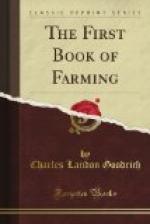=Kainite=, a potash salt used in making fertilizer.
=Kernel=, a single seed or grain.
=Leaching=, passing through and going off in drainage water.
=Legume=, a plant belonging to the bean, pea and clover family.
=Light soils=, soils which are loose and open and easy to work.
=Loam=, a mixture of sand, clay and organic matter.
=Mould board=, the curved part of the plow which turns the furrow slice.
=Mulch=, a covering on the soil. It may be of straw, leaves, pulverized soil or other material.
=Nectar=, a sweet substance in flowers from which bees make honey.
=Nitrate=, a soluble form of nitrogen.
=Nitrification=, the changing of nitrogen into a nitrate.
=Nitrogen=, a gas forming four-fifths of the air. Nitrogen is a very necessary food of plants.
=Organic matter=, substances produced by the growth of plants and animals.
=Osmose=, the movement of fluids through membranes or thin partitions.
=Oxygen=, a gas which forms one-fifth of the air. Its presence is necessary to the life of all green plants and all animals.
=Ovary=, the part of the pistil that bears the developing seeds.
=Ovule=, an immature seed in the ovary.
=Perennial=, living through several years.
=Phosphoric acid=, an important plant food found in phosphates.
=Pistil=, the part of the flower which produces seeds.
=Propagate=, to increase in number.
=Pollen=, the powdery substance produced by stamens.
=Pollination=, the transfer of pollen from stamens to pistils.
=Potash=, an important plant food.
=Pruning=, removing parts of a plant for the good of what remains.
=Retentive=, holding, retaining, said of soil which holds water.
=Reverted=, said of phosphoric acid in the process of becoming insoluble.
=Rotation of crops=, a change of crops in regular order.
=Sap=, the juice or liquid contents of plants.
=Seed bed=, the earth in which seeds are sown.
=Seedling=, a young plant just from the seed. Also a plant raised from a seed in distinction from one produced from a graft or a cutting.
=Sepal=, one of the parts of the calyx.
=Slip=, a cutting placed in water or moist soil or other substance to produce roots and form a new plant.
=Soil=, that part of the earth’s crust into which plants send their roots for food and water.
=Stamen=, that part of a flower which bears the pollen.
=Stigma=, the part of the pistil which receives the pollen.
=Stomata=, breathing pores in plants.
=Subsoil=, that part of the soil which lies beneath the soil that is worked with the tillage tools.
=Sap root=, a main root that runs straight down into the soil.




